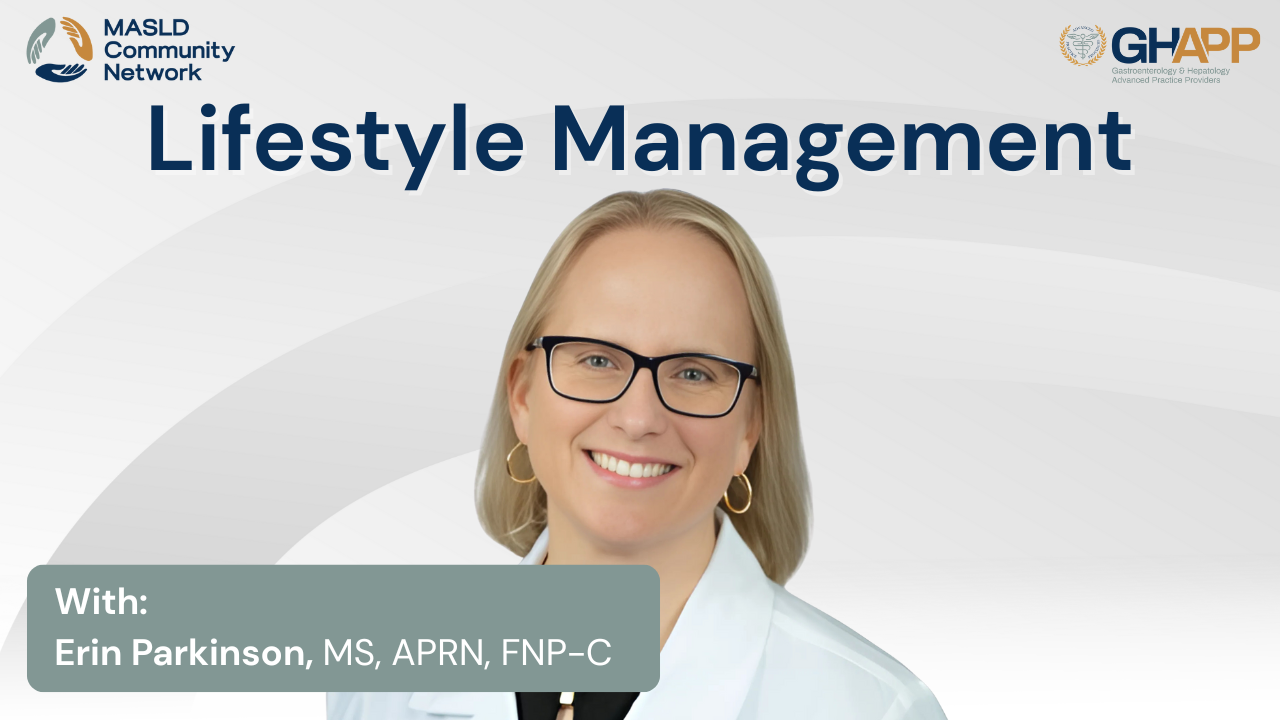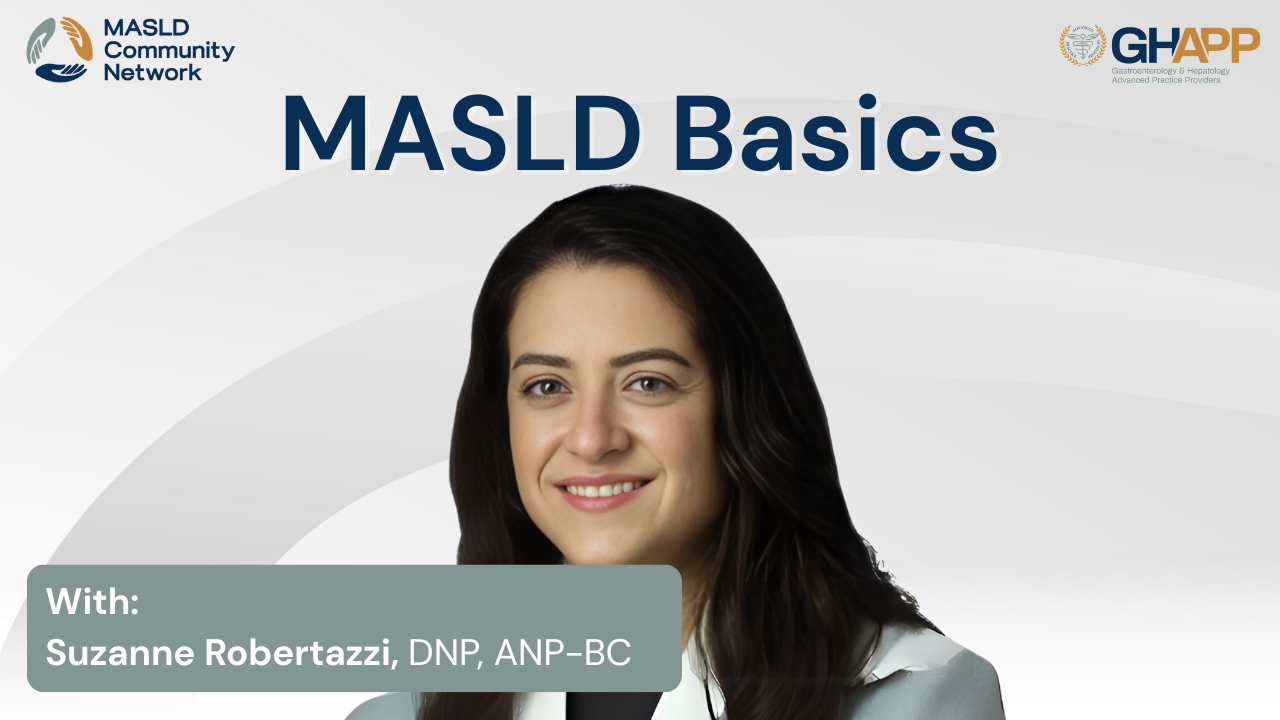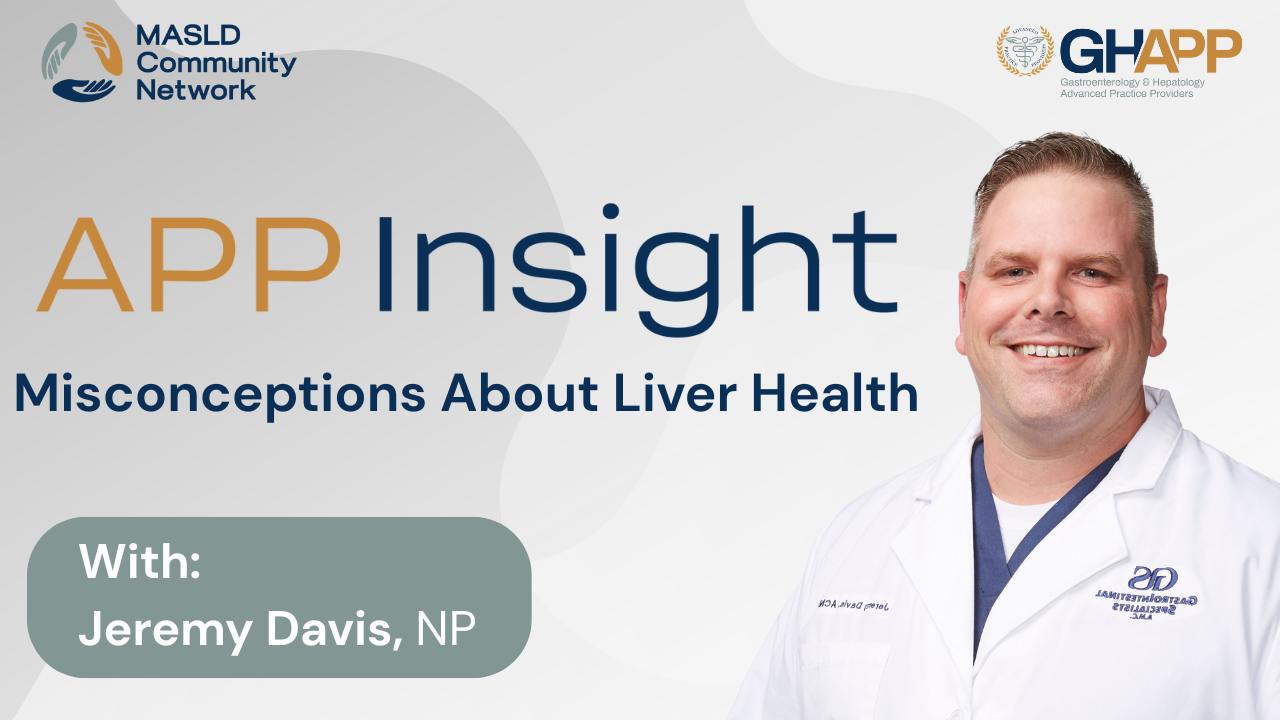
Jeremy Davis
ACNP-BC
Location : Shreveport, LA, USA
BIO
Jeremy Davis ACNP is a board-certified acute care nurse practitioner who has been practicing in the focus of hepatology at GastroIntestinal Specialists A.M.C. since 2012. Jeremy’s areas of interest include MASLD, MASH, Hepatitis B, Hepatitis C, cholestatic liver disease, and autoimmune liver disease.
Jeremy has been an active faculty ambassador of Gastroenterology & Hepatology Advanced Practice Providers (GHAPP) since 2019 and is a lecturer at both regional and national conferences.
Jeremy is also an Associate member of the American Association for the Study of Liver Diseases (AASLD) since 2014.
Jeremy received his Bachelor of Science degree and Master of Science Degree in Nursing from Northwestern State University in Natchitoches, Louisiana.
Jeremy’s hobbies include spending time with his family, cooking and traveling.
MASLD-MASH Content Featuring Jeremy

Lifestyle Management With Erin Parkinson

In this impactful session from the GHAPP MASLD Community Network, Erin Parkinson, NP, explores the vital role of lifestyle modifications in the management of MASLD (Metabolic dysfunction-associated steatotic liver disease) and MASH (Metabolic dysfunction-associated steatohepatitis). Through the lens of a real-world case study, Erin illustrates how clinical tools like FIB-4 and FibroScan® can be used to assess fibrosis risk and guide interventions for patients presenting with metabolic syndrome and hepatic steatosis. With a focus on practical, personalized care, this presentation highlights how diet, exercise, and culturally sensitive counseling can meaningfully reduce hepatic fat, inflammation, and fibrosis—key factors in preventing progression to cirrhosis or hepatocellular carcinoma. Erin discusses the impact of processed foods, high-fructose corn syrup, and sedentary behavior, while offering actionable guidance on introducing Mediterranean diets, intermittent fasting, and realistic exercise goals tailored to individual readiness and barriers. Whether you're a hepatology specialist, primary care provider, or obesity medicine clinician, this talk delivers tools to better support patients with MASLD/MASH through sustainable behavioral change and longitudinal follow-up.
Watch Now

MASLD Basics With Suzanne Robertazzi

Join Suzanne, a nurse practitioner from the Washington DC VA Medical Center, as she kicks off a comprehensive lecture series on steatotic liver disease, focusing on the evolving understanding of MASLD (Metabolic dysfunction-associated steatotic liver disease) and MASH (Metabolic dysfunction-associated steatohepatitis). In this foundational session, Suzanne walks through the new nomenclature replacing NAFLD and NASH, and outlines the clinical criteria used to identify and stratify patients along the MASLD–MASH spectrum. Learn how metabolic risk factors such as obesity, prediabetes, hypertension, and dyslipidemia contribute to disease progression, and explore the use of non-invasive diagnostic tools like Fib-4, FibroScan, and ELF scores to assess fibrosis. The session also discusses indications for liver biopsy, the implications of overlapping etiologies (like alcohol-associated liver disease), and strategies for identifying patients at high risk for cirrhosis, hepatocellular carcinoma (HCC), and liver-related mortality. This lecture equips clinicians, particularly those in primary care and hepatology, with a practical framework to evaluate steatosis, interpret metabolic profiles, and determine when to refer patients for specialty care. Whether you're new to liver disease or looking for updates on MASLD and MASH terminology, this session is an essential starting point.
Watch Now

Misconceptions About Liver Health

In this quick but powerful video, Jeremy Davis, NP from Shreveport, Louisiana, addresses some of the most common misconceptions about liver health that he encounters in clinical practice. Many patients believe that liver disease only occurs in people who drink alcohol, but Jeremy explains how conditions like MASLD (Metabolic dysfunction-associated steatotic liver disease) and MASH (Metabolic-associated steatohepatitis) can affect individuals regardless of alcohol use. He also clears up the myth that only overweight patients are at risk, pointing out that co-morbidities such as hypertension, high cholesterol, cardiovascular disease, and type 2 diabetes can contribute to liver disease—even in patients with a normal BMI. Finally, Jeremy explains why normal liver enzyme labs (ALT and AST) don’t always rule out liver disease, making it crucial to assess underlying risk factors and improve provider and patient awareness. This video is a valuable resource for both healthcare professionals and patients looking to better understand non-alcoholic liver disease and why early screening matters.
Watch Now

Management of Life Style Modification

This video focuses on the comprehensive management of patients with metabolic-associated steatohepatitis (MASH), emphasizing lifestyle modifications, dietary adjustments, and exercise strategies. Key topics include the importance of addressing risk factors like diet, exercise habits, and alcohol intake, as well as referrals to medically supervised weight loss clinics or bariatric surgery for advanced cases. The speaker highlights the benefits of the Mediterranean diet, intermittent fasting, and avoiding ultra-processed foods while discussing the role of resistance training to combat sarcopenia and maintain muscle mass. Practical advice and tailored recommendations ensure a holistic approach to managing MASH and improving patient outcomes.
Watch Now

Third Step of Life Style Management

This video provides a comprehensive overview of emerging pharmacologic treatments for metabolic-associated steatohepatitis (MASH) and their tailored applications based on patient profiles. Topics include FDA-approved therapies, drugs in advanced clinical trials (such as semaglutide and lanifibranor), and the potential for combination treatments targeting both steatohepatitis and fibrosis. The speaker emphasizes the importance of patient-specific approaches considering metabolic profiles, obesity, and diabetes status, alongside lifestyle interventions. Additionally, the video discusses the evolving interdisciplinary care model and highlights the exciting progress in non-invasive testing and treatment advancements for F2-F3 fibrosis.
Watch Now

Approved Medication for MASH/NASH

This video provides detailed guidance on selecting and monitoring patients for emerging therapies targeting advanced fibrosis (F2-F3) in NASH. Key topics include contraindications for patients with cirrhosis, considerations for concomitant medications, and dose adjustments for statins. The video outlines ideal candidates based on specific thresholds for VCTE, MRE, ELF scores, and other non-invasive tests while emphasizing the importance of ruling out portal hypertension and other liver diseases. It also reviews a stepwise monitoring approach, focusing on tolerability at three months and efficacy assessments at six and twelve months, with an emphasis on histologic and non-invasive test improvements.
Watch Now

Types of Diet for the Treatment of MASLD

This video explores comprehensive strategies for managing metabolic-associated steatohepatitis (MASH), focusing on fibrosis risk stratification, lifestyle modifications, and pharmacologic interventions. Learn about dietary recommendations like the Mediterranean diet, exercise guidelines emphasizing resistance training, and the role of intermittent fasting and processed food avoidance. The video also highlights weight loss targets, diabetes management, and emerging therapies such as GLP-1 receptor agonists and bariatric surgery, all aimed at improving liver health and patient outcomes.
Watch Now

NITs to Identify High Risk MASH Patients

Explore advancements in non-invasive diagnostics and risk stratification for liver fibrosis and MASH. This video highlights tools like FIB-4, transient elastography, and innovative scoring systems (e.g., FAST and Agile) to identify and predict outcomes for high-risk patients. Learn about serum biomarkers, updated guidelines, and the role of lifestyle interventions alongside targeted therapies for managing metabolic risks and advancing care in hepatology.
Watch Now

PCP Screening for MASH/MASLD: Identifying At-Risk Patients

In this episode, Jeremy Davis, NP from Gastrointestinal Specialists in Shreveport, Louisiana, discusses the vital role of primary care screening for MASLD (metabolic dysfunction-associated steatotic liver disease) and MASH (metabolic-associated steatohepatitis). With the rising prevalence of metabolic co-morbidities like type 2 diabetes, hypertension, dyslipidemia, and obesity, early identification of at-risk patients is more critical than ever. Jeremy outlines practical and evidence-based strategies for screening in the primary care setting, starting with simple tools like the FIB-4 score—which relies on common lab values—and how to interpret results to guide referrals to hepatology or GI specialists. He also discusses the downstream workup upon referral, including non-invasive tests like FibroScan, ELF score, and liver ultrasound. Treatment fundamentals such as the Mediterranean diet, physical activity, and weight loss remain the cornerstone of care, while emerging therapies like GLP-1 agonists and resmetirom offer new options for high-risk patients. Whether you’re a PCP, APP, or specialist, this episode offers clear guidance on how to incorporate MASLD screening into everyday workflows to catch liver disease early and optimize outcomes.
Watch Now
FAQ's

Misconceptions About Liver Health

In this quick but powerful video, Jeremy Davis, NP from Shreveport, Louisiana, addresses some of the most common misconceptions about liver health that he encounters in clinical practice. Many patients believe that liver disease only occurs in people who drink alcohol, but Jeremy explains how conditions like MASLD (Metabolic dysfunction-associated steatotic liver disease) and MASH (Metabolic-associated steatohepatitis) can affect individuals regardless of alcohol use. He also clears up the myth that only overweight patients are at risk, pointing out that co-morbidities such as hypertension, high cholesterol, cardiovascular disease, and type 2 diabetes can contribute to liver disease—even in patients with a normal BMI. Finally, Jeremy explains why normal liver enzyme labs (ALT and AST) don’t always rule out liver disease, making it crucial to assess underlying risk factors and improve provider and patient awareness. This video is a valuable resource for both healthcare professionals and patients looking to better understand non-alcoholic liver disease and why early screening matters.
Watch Now












